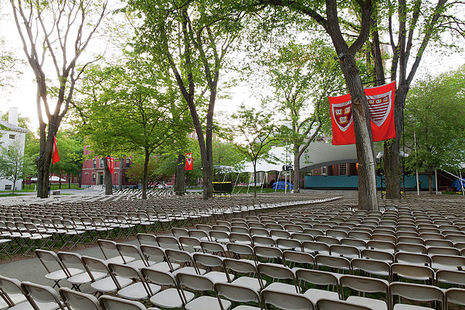It’s not just Trump who’s after international students
Bernard Shiu argues that the rise of populism poses a threat to international students’ access to education across the world

The morning it was reported that President Donald Trump halted Harvard University’s ability to host international students, the social media space unsurprisingly started filling up with condemnatory messages. Take a look at BBC’s Instagram posts, and you’ll see the usual comments criticising Trump for keeping the masses uneducated and copying the playbooks of the 20th century’s most notorious dictators.
Yet, I still felt as though most commenters had underestimated how serious this was. Many of them thought the solution was simple: ‘just study elsewhere, there are so many options! ’, one said. We might even, after learning that judges have temporarily blocked Trump’s restriction against Harvard, think that the President was the sole cause of the incident. I wonder, however, whether this is really just about Trump, or rather part of a wider populist surge across the liberal West. And with Reform UK’s recent rise, I fear that Cambridge might face this sooner than we think.
“I fear that Cambridge might face this sooner than we think”
Let’s face it: the populist backlash against cosmopolitanism and diversity in education is not uniquely American. Sure, on the surface their primary concerns seem to vary – say, Confederate racism in America instead of Rhodes’ colonialism in the UK – but deep down the core philosophy is the same. Populists are motivated by the common belief that cosmopolitan ideals dominate their country, allowing outsiders to drain valuable resources while threatening its stability. In this sense, international students are threatened by populism not just in America, but potentially across the whole democratic West.
In France, for example, where the National Rally coalition gained the most votes in the 2024 legislative election, universities are already bracing for the consequences of a potential RN government. Shortly after the first round, more than 100 university presidents jointly declared their fear that the RN would undermine student mobility and academic liberty, ultimately harming their ability to attract foreign talent who could immensely benefit French science. Their reaction is hardly surprising, given Marine Le Pen’s long-standing record of criticising multiculturalism for eroding French identity and traditions.
While Reform UK hasn’t had as much electoral success as the National Rally, it currently tops the majority of opinion polls in the UK, warranting a close examination of how they may threaten international students if in power. Reform’s manifesto pledges to ‘protect [the UK’s] culture, identity and values’ by restricting non-essential immigration. One can all but assume that international students, who are already facing stricter visa restrictions under the current Labour government, are among these ‘non-essentials’. While the manifesto doesn’t explicitly demand that universities adopt patriotic curricula, its proposal to withhold funding from universities which hold ‘political bias’ has a clear subtext – that universities must be reoriented to first serve British interests.
“International students bear the brunt of irresponsible politics”
Of course, there are key differences that make a Trump-esque crusade not entirely replicable elsewhere. The UK’s multiparty parliamentary system does give opposition parties more opportunities to challenge government plans, rather than allowing the Prime Minister to issue executive orders like US presidents. It also helps that Reform UK may require more time to consolidate support before advancing radical proposals. Yet, with the recent memory of Donald Trump winning the popular vote in the 2024 election despite Kamala Harris being favoured by most polls, it seems that everything in politics today is volatile and up for grabs. We must not let our guard down else we leave the door wide open for potential populist majorities in European legislatures to emulate Trump’s hostility.
The prospect of emerging populist governments in the West dominating higher education is enough to strike fear in the hearts of international students. For young people leaving their homeland and family to pursue a better future thousands of miles away, a sense of reassurance that everything will turn out fine is of paramount importance. Failing to provide this ultimately means that international students are forced to bear the mental brunt of irresponsible political agendas that we did not choose to be embroiled in.
I remain confident that the majority of Western universities, especially Cambridge, are committed to embracing international students in their academic communities. However, this doesn’t make formal protection any less urgent. Legislation and policies enacted in response to imminent threats are often ineffective, as they lack the time needed for proper development and integration into institutional frameworks, making them susceptible to reversal. We need governments and universities alike to guarantee that the free speech rights of international students are on par with citizens and spell out the conditions required to maintain visas. These policies will only work as prevention rather than reaction. The best time to protect international students’ rights to a secure academic journey is now.
 News / Colleges charge different rents for the same Castle Street accommodation2 March 2026
News / Colleges charge different rents for the same Castle Street accommodation2 March 2026 News / News in Brief: waterworks, wine woes, and workplace wins 1 March 2026
News / News in Brief: waterworks, wine woes, and workplace wins 1 March 2026 News / Climate activists protest for ‘ethical careers policy’1 March 2026
News / Climate activists protest for ‘ethical careers policy’1 March 2026 News / Angela Merkel among Cambridge honorary degree nominees27 February 2026
News / Angela Merkel among Cambridge honorary degree nominees27 February 2026 News / Private school teacher who lied about Cambridge degree barred from teaching27 February 2026
News / Private school teacher who lied about Cambridge degree barred from teaching27 February 2026









